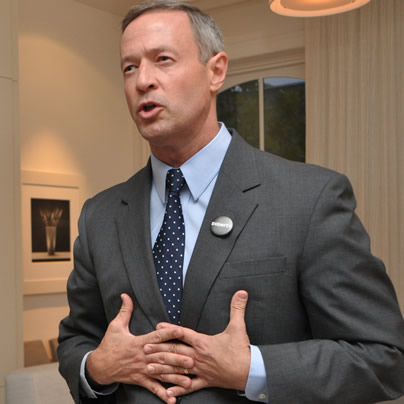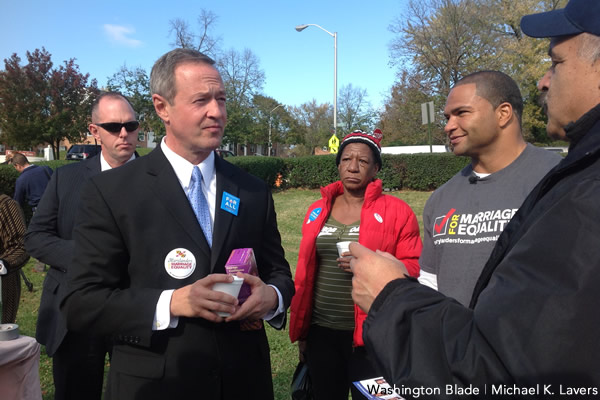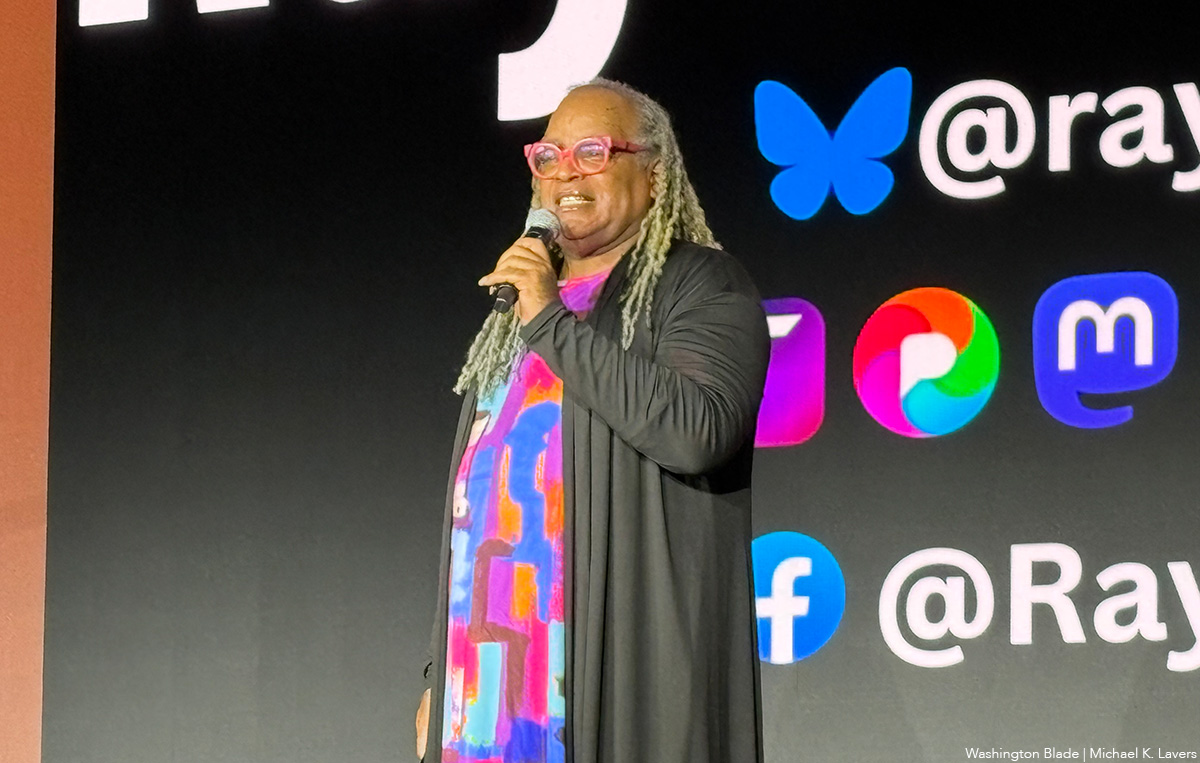Local
O’Malley on marriage, presidential aspirations
Md. guv applauds Question 6 campaign, downplays 2016 race


Gov. Martin O’Malley with Brendon Ayanbadejo of the Baltimore Ravens outside Northwood Elementary School in Baltimore on Nov. 6. (Washington Blade photo by Michael K. Lavers)
Maryland Gov. Martin O’Malley on Tuesday said he felt confident going into Election Day that the referendum on the state’s same-sex marriage law would pass.
“I had a pretty good sense in the course of those last 10 days that it was on a good positive trajectory,” he told the Washington Blade, recalling how delayed election results from Montgomery County prompted Marylanders for Marriage Equality not to declare Question 6 had officially passed until more than four hours after the polls had closed. “Once we figured that out then I started breathing a little more deeply. And then when the Montgomery County numbers came in and we were up to 51 [percent,] the night seemed to be coming into perspective.”
Question 6 passed by a 52-48 percent margin with Montgomery County voters supporting it by nearly two to one. Baltimore voters backed it by a 57-43 percent margin, while Question 6 lost in Prince George’s County by less than 4,000 votes.
O’Malley told the Blade he feels one of the campaign’s turning points came when Rev. Delman Coates of Mount Ennon Baptist Church in Clinton and Rev. Donté Hickman of Southern Baptist Church in Baltimore publicly supported the law he signed in March.
“There are lots of differences of opinion among clergy about this issue — and some are in favor of civil marriage equality, some are opposed,” said the governor. “For those guys to not only come to the conclusion personally and as citizens that civil marriage equality is the right change of law, but also to be willing to step up and speak to that in a public way allowed us to have a much more positive dialogue than the usual fear-based frames that have doomed these referenda in other states in the past.”
O’Malley also cited President Obama’s public support of marriage rights for same-sex couples during a “vulnerable election year” as another turning point for the pro-Question 6 campaign in Maryland. The governor also applauded him for statements in support of both nuptials for gays and lesbians and the Dream Act that will allow public colleges and universities to offer in-state tuition to undocumented immigrants during the Democratic National Convention.
The governor played an increasingly important role in Marylanders for Marriage Equality fundraising efforts in the weeks leading up to Election Day.
He headlined a star-studded New York City fundraiser gay former Republican National Committee Chair Ken Mehlman co-hosted on Sept. 13 that raised more than $100,000 for the pro-Question 6 group. The governor also attended an Oct. 2 fundraiser for Marylanders for Marriage Equality that D.C. Mayor Vincent Gray, House Minority Whip Steny Hoyer (D-Md.,) lesbian state Del. Heather Mizeur (D-Montgomery County) and others attended at gay Democratic lobbyist Steve Elmendorf’s Washington home.
O’Malley spoke at the Human Rights Campaign’s “Chefs for Equality” fundraiser at the Ritz-Carlton in Foggy Bottom on Oct. 25 that raised funds for the group’s pro-Question 6 efforts.
“We had a very good campaign by the end,” he said. “We continued to grow and evolve and become stronger every day. And it was a very well-run campaign. Josh Levin[ campaign director for Marylanders for Marriage Equality,] did a good job.”
When asked whether gays and lesbians were visible enough during the campaign, O’Malley said the pro-Question 6 television and radio ads that ran in the Baltimore and D.C. media markets were “very effective.”
“The ads, through a variety of different voices, got across the message that this is a timeless American truth that we should protect rights of all individuals equally while protecting religious freedom,” he said. “The thrust behind the ads was to make this a question that can and should be supported by all people — gay and straight, black and white, believers, non-believers, people of all faiths. With limited dollars that’s what we attempted to do. If we had more money perhaps we would have been able to run a greater variety of ads, but we were smart and strategic.”
O’Malley further stressed he feels gays and lesbians were “well-represented” in the campaign and among its leadership that included state lawmakers. He was reluctant to comment on whether the Washington Blade should have published the names of those who signed the petition in support of the referendum on the state’s same-sex marriage law.
“I don’t know that I’m qualified to comment on journalistic ethics,” said O’Malley. The Blade published the list to its website in July; the Baltimore Sun followed and published the list in October.
The governor also sought to downplay growing speculation about the possibility he will run for president in 2016.
“I’m running mostly to get some more sleep and some more time with my family lately,” he said. “I’m really looking forward to these next two years because with the president’s re-election we’re going to be able to solidify some important strides forward on health care and public safety and moving our state to the other side of this recession. So those are all the things I’m thinking about. I haven’t really given any thought to 2016.”
O’Malley further joked he “never had to be quite the multitasker as” he was during this election cycle. Question 6 and the three other referenda he supported passed. O’Malley also chairs the Democratic Governors’ Association.
“We won five of our six contested races and even won back Puerto Rico, which no one thought would happen. We came close in Indiana,” he said. “I’m still in the gratitude mode. I’m focused on the making the next two years the most effective they can possibly be for this administration that I lead.”
Virginia
McPike wins special election for Va. House of Delegates
Gay Alexandria City Council member becomes 8th LGBTQ member of legislature

Gay Alexandria City Council member Kirk McPike emerged as the decisive winner in a Feb. 10 special election for a seat in the Virginia House of Delegates representing Alexandria.
McPike, a Democrat, received 81.5 percent of the vote in his race against Republican Mason Butler, according to the local publication ALX Now.
He first won election to the Alexandria Council in 2021. He will be filling the House of Delegates seat being vacated by Del. Elizabeth Bennett-Parker (D-Alexandria), who won in another Feb. 10 special election for the Virginia State Senate seat being vacated by gay Sen. Adam Ebbin (D-Alexandria).
Ebbin is resigning from his Senate next week to take a position with Virginia Gov. Abigail Spanberger’s administration.
Upon taking his 5th District seat in the House of Delegate, McPike will become the eighth out LGBTQ member of the Virginia General Assembly. Among those he will be joining is Sen. Danica Roem (D-Manassas), who became the Virginia Legislature’s first transgender member when she won election to the House of Delegates in 2017 before being elected to the Senate in 2023.
“I look forward to continuing to work to address our housing crisis, the challenge of climate change, and the damaging impacts of the Trump administration on the immigrant families, LGBTQ+ Virginians, and federal employees who call Alexandria home,” McPike said in a statement after winning the Democratic nomination for the seat in a special primary held on Jan. 20.
McPike, a longtime LGBTQ rights advocate, has served for the past 13 years as chief of staff for gay U.S. Rep. Mark Takano (D-Calif.) and has remained in that position during his tenure on the Alexandria Council. He said he will resign from that position before taking office in the House of Delegates.
Local
Local LGBTQ groups, activists to commemorate Black History Month
Rayceen Pendarvis to moderate Dupont Underground panel on Sunday

LGBTQ groups in D.C. and elsewhere plan to use Black History Month as an opportunity to commemorate and celebrate Black lives and experiences.
Team Rayceen Productions has no specific events planned, but co-founder Rayceen Pendarvis will attend many functions around D.C. this month.
Pendarvis, a longtime voice in the LGBTQ community in D.C. moderated a panel at Dupont Underground on Feb. 8. The event, “Every (Body) Wants to Be a Showgirl,” will feature art from Black burlesque artists from around the country. Pendarvis on Feb. 23 will attend the showing of multimedia play at the Lincoln Theatre that commemorates the life of James Baldwin.
Equality Virginia plans to prioritize Black voices through a weekly online series, and community-based story telling. The online digital series will center Black LGBTQ voices, specifically trailblazers and activists, and contemporary Black queer and transgender people.
Narissa Rahaman, Equality Virginia’s executive director, stressed the importance of the Black queer community to the overall Pride movement, and said “Equality Virginia is proud to center those voices in our work this month and beyond.”
The Capital Pride Alliance, which hosts Pride events in D.C., has an alliance with the Center for Black Equity, which brings Black Pride to D.C. over Memorial Day weekend. The National LGBTQ Task Force has no specific Black History Month events planned, but plans to participate in online collaborations.
Cathy Renna, the Task Force’s director of communications, told the Washington Blade the organization remains committed to uplifting Black voices. “Our priority is keeping this at the forefront everyday,” she said.
The D.C. LGBTQ+ Community Center is also hosting a series of Black History Month events.
The D.C. Public Library earlier this year launched “Freedom and Resistance,” an exhibition that celebrates Black History Month and Martin Luther King Jr. It will remain on display until the middle of March at the Martin Luther King Jr. Memorial Library at 901 G St., N.W.
District of Columbia
U.S. Attorney’s Office drops hate crime charge in anti-gay assault
Case remains under investigation and ‘further charges’ could come

D.C. police announced on Feb. 9 that they had arrested two days earlier on Feb. 7 a Germantown, Md., man on a charge of simple assault with a hate crime designation after the man allegedly assaulted a gay man at 14th and Q Streets, N.W., while using “homophobic slurs.”
But D.C. Superior Court records show that prosecutors with the Office of the U.S. Attorney for D.C., which prosecutes D.C. violent crime cases, charged the arrested man only with simple assault without a hate crime designation.
In response to a request by the Washington Blade for the reason why the hate crime designation was dropped, a spokesperson for the U.S. Attorney’s office provided this response: “We continue to investigate this matter and make no mistake: should the evidence call for further charges, we will not hesitate to charge them.”
In a statement announcing the arrest in this case, D.C. police stated, “On Saturday, February 7, 2026, at approximately 7:45 p.m. the victim and suspect were in the 1500 block of 14th Street, Northwest. The suspect requested a ‘high five’ from the victim. The victim declined and continued walking,” the statement says.
“The suspect assaulted the victim and used homophobic slurs,” the police statement continues. “The suspect was apprehended by responding officers.”
It adds that 26-year-old Dean Edmundson of Germantown, Md. “was arrested and charged with Simple Assault (Hate/Bias).” The statement also adds, “A designation as a hate crime by MPD does not mean that prosecutors will prosecute it as a hate crime.”
Under D.C.’s Bias Related Crime Act of 1989, penalties for crimes motivated by prejudice against individuals based on race, religion, sexual orientation, gender identity, disability, and homelessness can be enhanced by a court upon conviction by one and a half times greater than the penalty of the underlying crime.
Prosecutors in the past both in D.C. and other states have said they sometimes decide not to include a hate crime designation in assault cases if they don’t think the evidence is sufficient to obtain a conviction by a jury. In some instances, prosecutors have said they were concerned that a skeptical jury might decide to find a defendant not guilty of the underlying assault charge if they did not believe a motive of hate was involved.
A more detailed arrest affidavit filed by D.C. police in Superior Court appears to support the charge of a hate crime designation.
“The victim stated that they refused to High-Five Defendant Edmondson, which, upon that happening, Defendant Edmondson started walking behind both the victim and witness, calling the victim, “bald, ugly, and gay,” the arrest affidavit states.
“The victim stated that upon being called that, Defendant Edmundson pushed the victim with both hands, shoving them, causing the victim to feel the force of the push,” the affidavit continues. “The victim stated that they felt offended and that they were also gay,” it says.
-

 Virginia3 days ago
Virginia3 days agoMcPike wins special election for Va. House of Delegates
-

 New York5 days ago
New York5 days agoN.Y. lawmaker vows ‘Pride flag will fly again’ at Stonewall Monument
-

 a&e features4 days ago
a&e features4 days agoMeet D.C.’s Most Eligible Queer Singles
-

 District of Columbia4 days ago
District of Columbia4 days agoU.S. Attorney’s Office drops hate crime charge in anti-gay assault


















